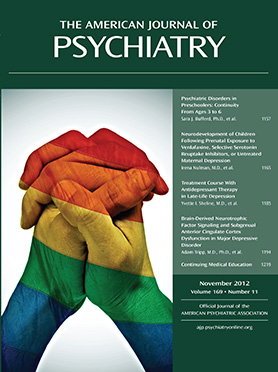The question of whether maternal antidepressant treatment during pregnancy is better or worse for the offspring than untreated maternal depression is still mostly unanswered.
The majority of studies addressing this issue have focused on the risks of neonatal malformation and on immediate postpartum neonatal discontinuation syndrome (also known as neonatal withdrawal or adaptation syndrome). Several guidelines have been published over the past 5 years, by the American Psychiatric Association and the American College of Obstetricians and Gynecologists (
1), Great Britain’s National Institute for Health and Clinical Excellence (
2), the Scottish Intercollegiate Guidelines Network (
3), and the Black Dog Institute of Australia (
4). They all end with a cautionary statement that the decision to use medication during pregnancy must take into account any possible risk associated with using antidepressants at this time.
Monitoring of a specific malformation and/or postpartum neonatal discontinuation syndrome among antidepressant-exposed pregnancies is based on retrospective case-control surveillance, which has obvious limitations. Based on recent data from the Metropolitan Atlanta Congenital Defects Program, the risk of major structural or genetic birth defects in the United States is approximately 3% of all births (
5). To date, there is no report suggesting that the use of antidepressants during pregnancy increases that risk above the general population risk of 2%–3%, nor is there evidence to indicate that they might cause organ-specific defects. The only exception is the reports suggesting that paroxetine use early in pregnancy is associated with an increased risk of atrium septum defects (
6,
7).
More recently, several larger cohort databases have presented a more optimistic view when comparing the ill effects of untreated maternal depression to the outcomes for neonates born to mothers exposed to antidepressants during pregnancy (
8,
9). Works by Spinelli (
10) and by Diav-Citrin and Ornoy (
11) are also informative.
My colleagues and I recently completed a large systematic review and meta-analysis of pregnancy and delivery outcomes after exposure to antidepressants (
12). We focused on gestational age, birth weight, and APGAR scores among infants exposed to antidepressants in utero. Although the results showed statistically significant associations for all three outcomes, the effects found were small in magnitude (gestational age approximately 3 days shorter, birth weight 75 g lower, and difference in APGAR scores at 1 and 5 minutes less than half a point), and the values in the exposed group typically fell within the normal range.
There are a handful of studies that examined the impact of antidepressant exposure during pregnancy on developmental milestones in the offspring. These include both testing for cognitive and behavioral functioning in preschoolers and long-term follow-up into adolescence and adulthood. None suggests any significant negative impact; see data from the Danish National Birth Cohort (
13) and the Norwegian Mother and Child Cohort Study (
14).
There is, however, ample evidence that anxiety, depression, and in particular, stress during pregnancy, especially early in gestation, can have adverse effects on fetal maturation, cognitive performance during infancy, and learning and memory in 6- to 8-year-old children (
15,
16).
In this issue, Nulman and colleagues (
17) present data on the effects of prenatal exposure to venlafaxine, selective serotonin reuptake inhibitors (SSRIs), and maternal depression on long-term child neurodevelopment. The results failed to show an effect of antidepressant medication on children’s intellectual or behavioral outcomes. Instead, the results showed that untreated depression is associated with a higher risk for postpartum depression and that prenatal and childhood exposure to maternal depression is associated with behavioral problems in the offspring and may increase the risk for long-term psychopathology.
The same group, from the Motherisk Program at the Hospital for Sick Children in Toronto, under the directorship of Gideon Koren, was the first to publish, 10 years ago, results along the same lines. In a prospective, controlled study, Nulman and colleagues (
18) found that exposure to tricyclic antidepressants or fluoxetine throughout gestation was not associated with poor cognition, nor did it affect language development or temperament of preschool and early-school children, whereas maternal depression was associated with less cognitive and language achievement in the offspring.
Regardless of this encouraging perspective, health care providers should keep in mind that in order to prescribe antidepressants during pregnancy, the indication must be compelling. Not only is it crucial to establish an axis I diagnosis, it is also important to assess the degree of distress and the burden of illness that the pregnant woman is experiencing. It is also paramount to have a frank discussion with the patient (and whenever possible, with her partner in attendance) on the pros and cons of using antidepressants during pregnancy based on the most recent available evidence and to obtain her or their consent.

